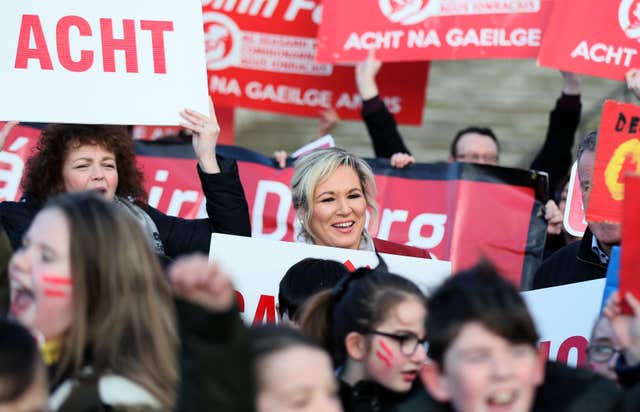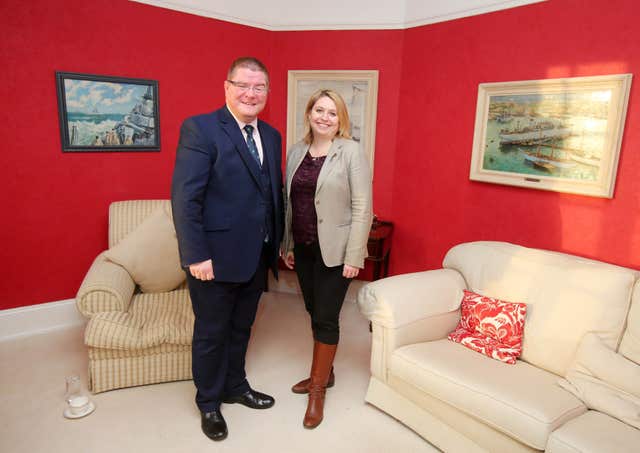
Language activists and same-sex marriage campaigners have urged the Government to step in and legislate for their causes if Stormont powersharing does not return.
The calls came as Northern Ireland Secretary Karen Bradley met a range of lobby groups in Belfast.
She had discussions with representatives from the Irish language and Ulster Scots sectors, as well as Love Equality NI – the group spearheading the campaign to end the region’s ban on same-sex marriage.
An impasse over Sinn Fein’s demand for an Irish Language Act is at the heart of the powersharing crisis at Stormont, with the Democratic Unionists standing firm in their opposition to a stand-alone piece of legislation that does not incorporate other cultures, such as Ulster Scots.
The prohibition on gay marriage is another vexed issue on the table in the negotiations to restore the devolved institutions.

Ahead of the meetings, pupils from Irish language schools demonstrated at Stormont. The colourful and noisy protest saw primary and secondary school children call for an Irish Language Act.
At the later meetings, Irish language group Conradh na Gaeilge and Love Equality NI both made direct appeals to Mrs Bradley to commit to pass legislation at Westminster if direct rule was returned.
The Secretary of State declined to give such undertakings, stressing that the issues remained very much devolved.
Secretary of State for Northern Ireland Karen Bradley met Love Equality NI, Conradh na Gaeilge and the Ulster-Scots Agency at Stormont House today. pic.twitter.com/Bubt7AS5tg
— Northern Ireland Office (@NIOPressOffice) February 1, 2018
“It’s clear issues such as equal marriage and minority languages are important to many people across the community in Northern Ireland, so I welcomed the chance to listen and be informed by today’s meetings,” she said.
“The fact remains, the issues these groups lobby on are devolved. Therefore it is essential all parties use the opportunity provided by the current phase of talks to restore devolved government and allow any important decisions on these issues to be taken by locally-elected politicians.
“This is what the people of Northern Ireland voted for and this is what we are all working so hard to deliver.”
Irish language school kids march on Stormont demanding legislation. @PA pic.twitter.com/NUQ2kuKqj4
— David Young (@DavidYoungPA) February 1, 2018
Katy-Rose Meade, an A-level student from Colaiste Feirste secondary school in Belfast, was one of those pressing Mrs Bradley to act.
“Nothing other than a stand-alone rights-based Irish Language Act, as is afforded to other minority language communities on these islands, will do,” she said.
“We have had enough of the attacks, of the discrimination and we are finally fighting back.”
Patrick Corrigan, of the Love Equality campaign, said: “We made clear to the Secretary of State that we expect her Government to introduce marriage equality legislation at Westminster to bring Northern Ireland into line with the rest of the UK and Ireland, if there is no restoration of devolution.
“We would prefer our own Assembly to deliver marriage equality but if it cannot or will not, then it is unacceptable that same-sex couples here should be made to wait a moment longer for the right to be treated equally under the law.”

Ulster-Scots Agency chief executive Ian Crozier said a broader approach to cultural identity was required.
“Today’s meeting was a good opportunity to introduce the new Secretary of State to Ulster-Scots and some of the wider issues within the current cultural debate,” he said.
“The issues discussed included the fact that the current debate is better understood as relating to cultural identity, rather than simply minority language issues, as this broader approach more accurately reflects the position in Northern Ireland.
“It was also reflected that while words like equality and respect often featured prominently within the debate, that actual equality and respect were often in short supply when it came to the treatment of Ulster-Scots.”


Comments: Our rules
We want our comments to be a lively and valuable part of our community - a place where readers can debate and engage with the most important local issues. The ability to comment on our stories is a privilege, not a right, however, and that privilege may be withdrawn if it is abused or misused.
Please report any comments that break our rules.
Read the rules here